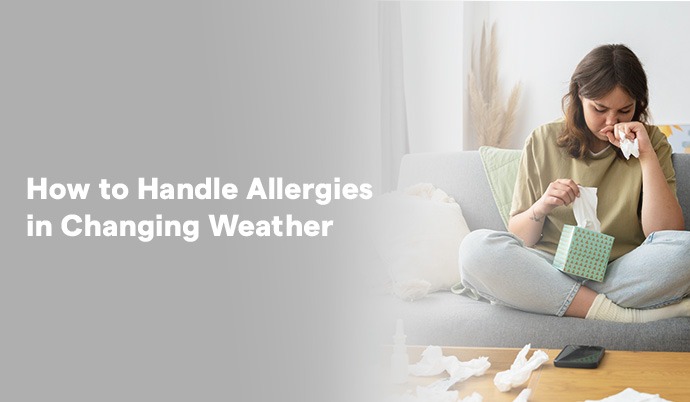
The Indian Journal of Dermatology has recorded that in the Indian population, almost 30% of the population is allergic to the skin with the changing seasons. Cities are particularly at risk due to pollution, changes in climate and lifestyle triggers. Dermatologists in the metro cities claim that there has been a constant increase in skin allergies such as eczema, urticaria (hives), fungal diseases, and contact dermatitis that are promoted by the changing climatic conditions, all screaming for better skincare and timely allergy treatment.
Why Does Weather Have So Much Impact on Your Skin?
Your skin is a little delicate radar system; it catches all alterations of the environment and reacts to them. The sudden rise and fall of the temperature or the humidity levels disorients the skin barrier, as it is the protective shield. When this barrier is weakened, allergens such as pollen, dust or mold or even sunlight, can creep in and cause a reaction. During summer, it is the sweat that causes irritations, rashes and sun allergies. During the monsoon period, your skin is fighting fungal infections due to the constant wetness. And in the winter, it is the drying, flaking, itchy eczema outbreaks. In essence, all your skin is attempting to survive the Indian climate, and it requires your care.
Summer Allergies
During summers, too much sweating is what blocks your pores, especially where the skin rubs against itself, such as underarms, thighs and neck, leading to the need for summer skincare. This leads to Miliaria, a red, itchy rash found on the skin, also called prickly heat. Whenever some severe UV rays hit your skin, with an addition of some photodermatitis, which causes your skin to be allergic to sunlight.
To treat these seasonal allergies, make sure to use light and gel-based moisturisers, avoid ones that block the pores of the skin, as an essential summer skincare tool and wear clothes made of loose cotton fabrics to allow the skin to breathe. There is no excuse for this; sunscreen is a must-have item at all times, even when indoors. The sunscreen should be a broad-spectrum SPF and must contain physical blockers such as zinc oxide, as they are less harsh to sensitive skin. Additionally, avoid heavy makeup and use non-comedogenic products, which produce heat and bacteria.
Monsoon Allergic Madness
The monsoon is nothing short of magical; it is also a fungal feast on your skin. Humid climate, puddle-jumping and wet clothes are ideal situations in which fungal infections would flourish. Some of the commonest skin problems at that time include ringworm, athlete's foot, and body fold rashes (also called intertrigo) in places such as Mumbai, Kolkata, and Chennai, which remain moist throughout the months.
Fight this with a firm, dried-up routine. Never forget to pat-dry your body after a shower, particularly under arms, between toes and under the bust line. Powders such as Clocip or Abzorb should be used on the areas that tend to sweat. Motivate people to ditch the synthetic clothing and opt, instead, to wear breathable fabrics that avoid the trapping of moisture. And when you observe red, round lesions with itching, consult the specialist at the earliest, as fungal processes are more difficult to cure.
Winter Allergies
Winter, especially in North India, can be quite comfortable, but to your skin, it is a nightmare of dryness, itchiness and inflammation. The chilly, dry air outside and the dry air of heaters inside the houses absorb every drop of moisture, thus leaving your skin dry, flaky, and tight. Winter is the time of the year when people with conditions such as eczema or psoriasis have severe flare-ups.
In the winter, it is better to switch to cream-based moisturisers that contain such components as ceramides, hyaluronic acid, or shea butter, which help keep your skin safe. Treat your skin in layers, and apply a hydrating serum and lock it with a heavy moisturiser. Do not wear woollen garments, directly against the skin; insist on a cotton lining to cut down the irritation. And resist taking those long, hot showers at all costs; this only removes the natural oils in your skin to make it even worse.
Adhere to a Seasonal Routine
The worst thing that most people do is they use the same products throughout the year. During the summer, use lightweight moisturisers based on water and gels for cleaning. During the monsoon, use antifungal washes and products that have them as ingredients, such as tea tree oil. During the winter, switch to stickier creams and non-foaming body washes that are moisturising.
Moreover, you should set yourself a rule to not use something that adds a stronger fragrance, alcohol and parabens, which will find their way into even the creamiest of lotions and perfumes and may cause an allergic reaction. New products are to be patch-tested and should be added to your routine one product at a time.
And have you ever guessed, clothes may also provoke seasonal allergies? Man-made materials absorb sweat and raise friction that may lead to chaffing and rashes. Wool is scratchy, and, in the winter, wool may induce contact dermatitis. In summer and monsoon, wear only 100% cotton clothes. Wear woollen clothing in winter, and cotton underneath.
And do not forget about your laundry routine as well. Sensitive skin can get offended by leftover detergent or fabric softeners. Selecting fragrance-free hypoallergenic detergents and properly overdosing your machine with soap should be enacted. Always make sure that you are wearing dry clothes, especially during monsoon, as wet clothes serve as a breeding ground for fungi.
See what you are eating, too. Food allergies are not always a part of seasonal allergies, although they tend to behave worse when the weather changes. As an example, excess fermented or spicy food taken during the monsoon could cause skin rashes or an itch in those with weak tolerance. People usually get so much dairy and dry fruits in the winter, which causes the stimulation of acne or eczema.
Follow the normal diet and ensure that it contains a lot of vitamin C, E and omega-3 fatty acids, which can promote healing of the skin and reduce inflammation. Get plenty of water (yes, even cold), natural detoxifiers, such as turmeric milk (or turmeric tea made with dandelion leaves), green tea and fresh fruits. What you consume shows on your skin, particularly when the weather is already trying to destroy it.
Yet there is this one thing that we are not discussing enough, and that is the mind-skin connection. Your immune system can become weak when you are stressed, particularly when the weather is changing, during exam season, work-related worries, or even when you fail to get sufficient sleep. This increases your risk of developing an allergic reaction, particularly when you already have eczema, urticaria or psoriasis.
The solution? Breathe. Sleep. Unplug. A daily ritual of mindfulness in under 10 minutes reduces cortisol levels and can make your skin better. Give yourself a break, immerse your body, and develop some other such activities that would help you relax, such as oiling your hair or having a cup of warm haldi doodh, before you sleep. Caring for yourself does not sound vice-y; it is your skin defence strategy.
When to Visit a Dermatologist?
Let us be honest about no rash requires an emergency, but it is also true that not all allergies can be treated at home. Depending upon whether your skin reaction is:
In some cases, skin allergies are either misdiagnosed or treated with over-the-counter creams, which aggravate the condition. A specialist from the best dermatology hospital in Delhi is the only person who can determine whether you have an allergy, a viral or bacterial infection, or a skin disease and prescribe appropriate remedies for allergy treatment.
Your skincare does not need to be like the Indian weather. When you get to know how your skin reacts to temperatures, humidity and pollution, you gain the power to be ahead of the seasonal allergies before they start. It is not a matter of freaking out when a rash comes, but it is a matter of establishing a routine where such a problem never crops up. Therefore, the next time it gets stormy or a cold snap comes along, do not think that your skin is indifferent to the weather: it is in a relationship with it. Nurture it, cherish it and keep the
bond healthy. And with just a few seasonal skin tricks up your sleeves, you can sail through months of allergies like clockwork, free of any itching or rashes, and looking radiant. And for proper diagnostic care and treatment of these skin allergies in this changing weather, book an appointment with Sir Ganga Ram Hospital today.




